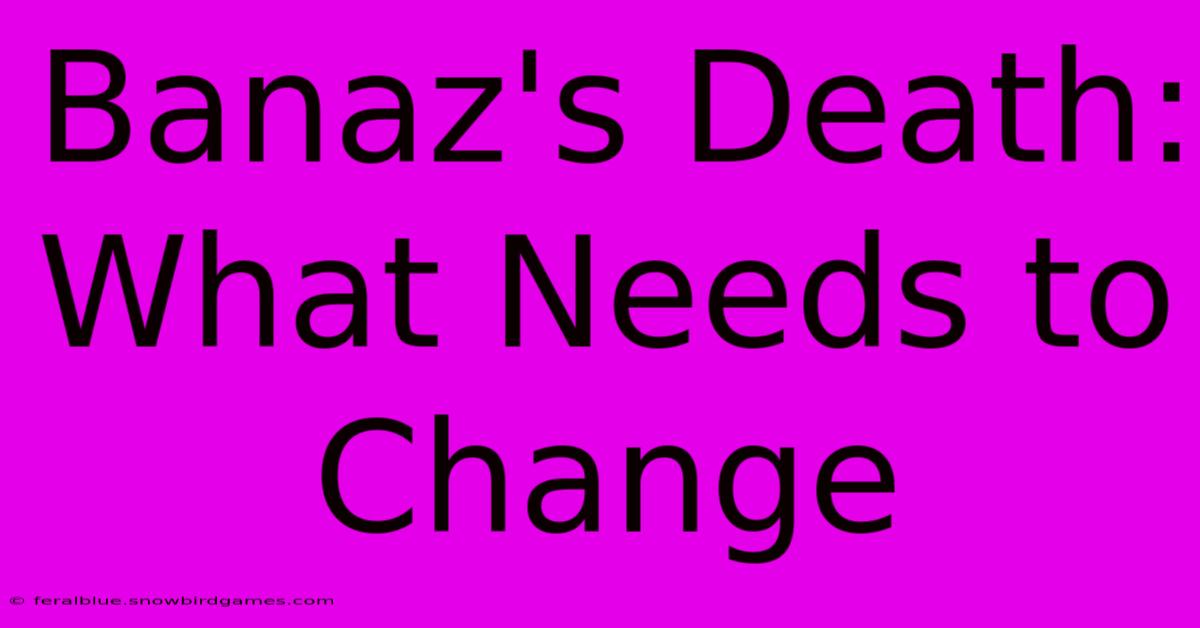Banaz's Death: What Needs To Change

Table of Contents
Banaz Mahmod's Death: What Needs to Change to Prevent Honour Killings
The brutal murder of Banaz Mahmod in 2006 remains a chilling reminder of the devastating impact of so-called "honour" killings. This horrific crime, where a young woman was killed for defying her family's patriarchal expectations, highlighted systemic failures in protecting vulnerable individuals from violent extremism. More than a decade later, the question remains: what needs to change to prevent future tragedies like Banaz's?
Understanding the Complexities of Honour-Based Violence
Honour-based violence (HBV) is a complex issue rooted in cultural beliefs and patriarchal structures. It encompasses a range of abuses, including forced marriage, female genital mutilation (FGM), and, tragically, murder. These acts are often perpetrated by family members who believe they are upholding their family's "honour" by controlling the women in their lives. It's crucial to understand that honour killings are not about honour; they are about control and violence. They are a gross violation of human rights.
Key Challenges in Tackling HBV:
- Cultural Sensitivity vs. Legal Enforcement: Navigating the delicate balance between respecting cultural sensitivities and enforcing laws protecting victims is a significant challenge. Many communities fear that open discussion of HBV will stigmatize their culture. However, silence allows abuse to flourish.
- Underreporting and Fear of Retaliation: Victims often remain silent due to fear of further violence against themselves or their families. This fear prevents them from seeking help from authorities.
- Lack of Awareness and Education: A lack of public awareness about HBV hinders identification and intervention. Educational programs targeting communities at risk, as well as law enforcement and social services, are vital.
- Inadequate Support Systems: Victims need access to comprehensive support services, including safe housing, legal aid, and psychological counselling. These services must be culturally sensitive and readily available.
What Needs to Change? A Multi-pronged Approach
Preventing future tragedies requires a multi-faceted approach involving multiple stakeholders:
1. Strengthen Legal Frameworks:
- Improved Data Collection: Accurate data on HBV incidents is crucial for understanding the scale of the problem and targeting resources effectively. Consistent recording and reporting mechanisms are needed.
- Enhanced Prosecution and Sentencing: Stronger legal frameworks with harsher penalties for perpetrators are essential to deter future crimes. This includes prosecuting those who participate in, or fail to prevent, honour killings.
- Protection Orders and Witness Protection Programs: Robust protection orders and witness protection programs are crucial for safeguarding victims and witnesses from further harm.
2. Empowering Communities:
- Community Engagement and Education: Initiatives that promote gender equality, challenge patriarchal norms, and raise awareness about HBV within at-risk communities are vital. This requires working with community leaders and elders to foster change from within.
- Interfaith Collaboration: Religious leaders can play a significant role in challenging harmful cultural practices and promoting tolerance and respect. Collaboration between different faiths can strengthen this message.
- Support for Victims and Families: Providing culturally sensitive support for victims and their families, including access to safe houses, therapy, and legal aid, is critical to their recovery and safety.
3. Improving Inter-agency Coordination:
- Enhanced Training for Professionals: Training law enforcement, social workers, and healthcare professionals to recognize the signs of HBV and respond effectively is vital.
- Improved Information Sharing: Better information sharing between agencies involved in protecting victims (police, social services, healthcare) is essential for coordinated responses.
Banaz's Legacy: A Call to Action
Banaz Mahmod's death should not be in vain. Her story serves as a powerful reminder of the urgent need to address honour-based violence. By implementing comprehensive strategies that address the legal, social, and cultural dimensions of this issue, we can create safer communities and prevent future tragedies. This requires a collective commitment from governments, communities, and individuals to challenge harmful norms and protect vulnerable lives. The fight to end honour killings is a fight for justice, equality, and human rights. Let's ensure that Banaz's memory serves as a catalyst for meaningful and lasting change.

Thank you for visiting our website wich cover about Banaz's Death: What Needs To Change. We hope the information provided has been useful to you. Feel free to contact us if you have any questions or need further assistance. See you next time and dont miss to bookmark.
Featured Posts
-
Justice Delayed Not Denied You Cant Take My Daughter
Apr 02, 2025
-
The Secret Life Of Anne Boleyns Son
Apr 02, 2025
-
Paras Shah Sons Revolutionary Approach
Apr 02, 2025
-
Michael Sheens Spending Habits And Net Worth
Apr 02, 2025
-
Asmita Adhikari Age Finally The Answer
Apr 02, 2025
